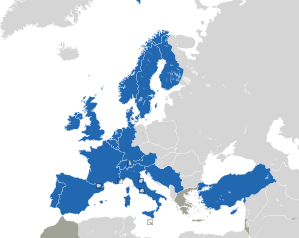| Eurovision Song Contest 1984 | |
|---|---|
 | |
| Dates | |
| Final | 5 May 1984 |
| Host | |
| Venue | Théâtre Municipal Luxembourg City, Luxembourg |
| Presenter(s) | Désirée Nosbusch |
| Musical director | Pierre Cao |
| Directed by | René Steichen |
| Executive supervisor | Frank Naef |
| Executive producer | Ray van Cant |
| Host broadcaster | Radio Télévision Luxembourg (RTL) |
| Website | eurovision |
| Participants | |
| Number of entries | 19 |
| Debuting countries | None |
| Returning countries | |
| Non-returning countries | |
| |
| Vote | |
| Voting system | Each country awarded 12, 10, 8-1 point(s) to their ten favourite songs |
| Winning song | "Diggi-Loo Diggi-Ley" |
The Eurovision Song Contest 1984 was the 29th edition of the Eurovision Song Contest, held on 5 May 1984 in the Théâtre Municipal in Luxembourg City, Luxembourg. Organised by the European Broadcasting Union (EBU) and host broadcaster Radio Télévision Luxembourg (RTL), the contest was held in Luxembourg following the country's victory at the 1983 contest with the song "Si la vie est cadeau" by Corinne Hermès. The event was presented by Désirée Nosbusch, who, at 19 years old, remains the youngest person to have hosted the contest as of 2024[update].
Nineteen countries participated in the contest, with Ireland returning after a one-year absence, and Greece and Israel, which had participated in the previous year's event, declining to enter. The winner was Sweden with the song "Diggi-Loo Diggi-Ley", composed by Torgny Söderberg, written by Britt Lindeborg and performed by the group Herreys. This was Sweden's second contest victory, coming ten years after ABBA's win in the 1974 contest. Ireland finished as runner-up, Spain and Denmark placed third and fourth, respectively, and Belgium and Italy tied for fifth place.
